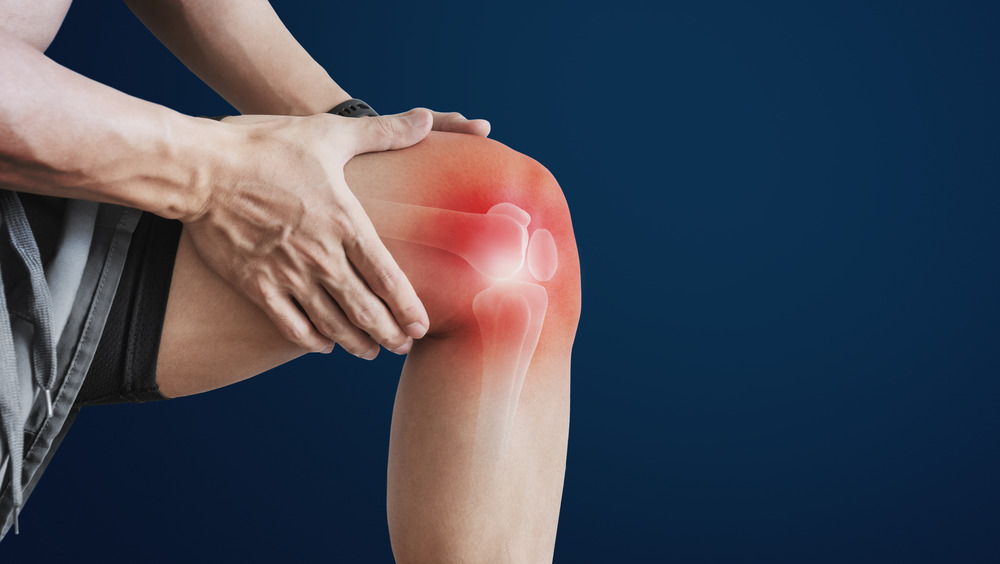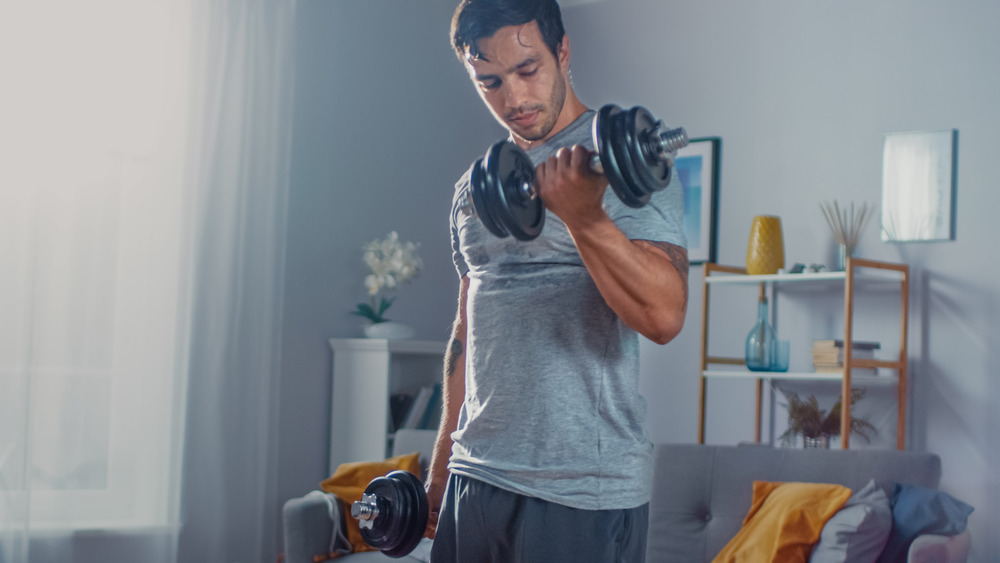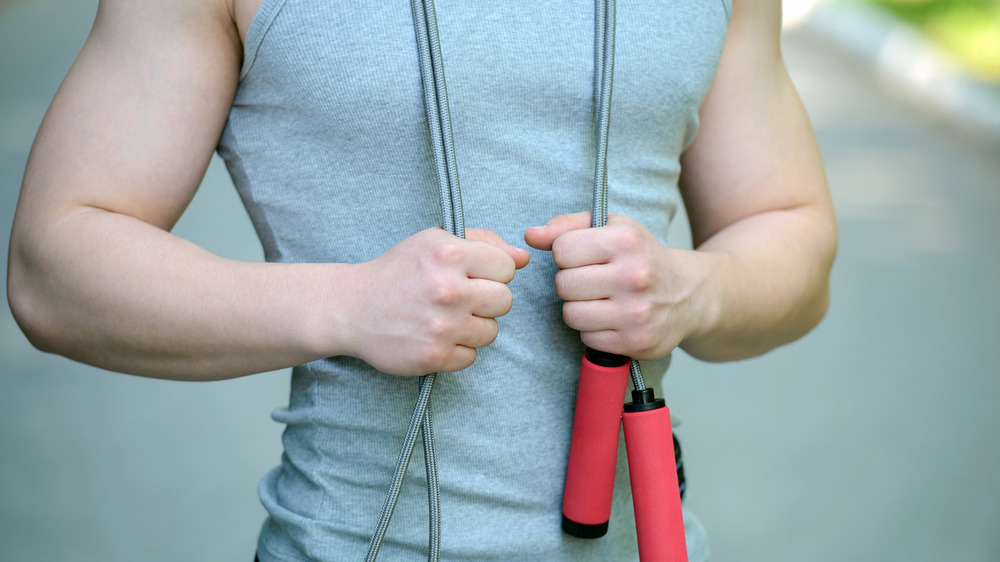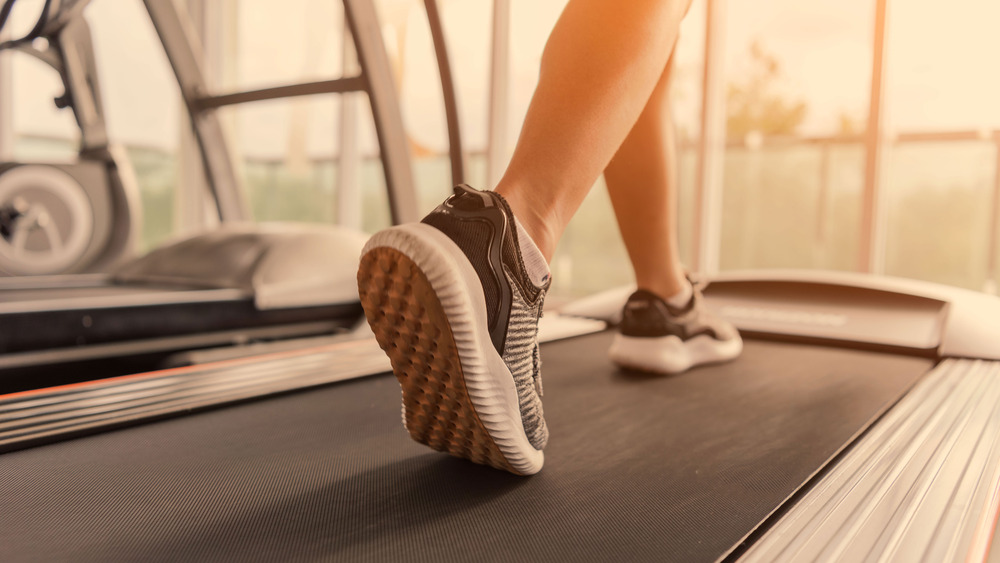When You Only Do Cardio, This Is What Happens To Your Body
Cardio is on the rise. While exercise fads come and go, cardiovascular exercise or aerobic exercise (defined as activities that raise your heart rate significantly) remains an increasingly popular choice for fitness fanatics and light exercisers alike. According to a survey conducted by Statista, cardio activities such as running, jogging, and trail running, were far ahead of the most popular outdoor activities for Americans between 2009 and 2019.
What's more, the number of people partaking in these cardio activities raised by around 15 million participants in that same period, showing that more and more individuals are embracing the health benefits and sweet high that cardio can give you. But it's important to remember that, although running, jogging and other cardio exercises like swimming or cycling remain some of the most popular and easily accessible workout choices out there, other forms of exercise such as resistance training may offer benefits that cardio alone can't. And if you're opting to just do cardio, it's useful to know how it could affect your body. So lace up your shoes, and let's step to it and take a look!
If you only do cardio, you might sleep a lot easier
Heading out for some energetic cardio can leave you feeling pretty pumped. But once this wears off, you might find that your cardio workout plan is helping you get to sleep easier and quicker than before.
As Dr. Charlene Gamaldo, medical director of Johns Hopkins Center for Sleep at Howard County General Hospital, says: "We have solid evidence that exercise does, in fact, help you fall asleep more quickly and improves sleep quality" (via John Hopkins Medicine). Gamaldo points towards moderate aerobic exercise as particularly beneficial for improving sleep, with cardio exercise improving the amount of slow-wave sleep, or deep sleep, you get.
According to the American Sleep Association, a deep sleep state is vital for consolidating new memories and for correct body and brain function, so if you're struggling to get enough quality shut-eye, prioritizing cardio can help. Best of all, you may see the effects quickly: as Gamaldo says, "It's generally not going to take months or years to see a benefit, and patients don't need to feel like they have to train for the Boston Marathon to become a better sleeper". Sounds good to us!
You may well lose quite a bit of weight when you only do cardio
Forms of cardio exercise are well-known to get your body moving, and one of the main draws of cardio is the benefits to your weight it could bring. When you do cardio, as The Mayo Clinic states, your body engages the large muscles in your body repeatedly, with your heart rate rising and your breathing quickening and deepening. The increased activity that your body undertakes results in burning calories, and the more calories you burn, the more you lose weight (provided that you're at a calorie deficit).
As such, cardio has become a popular choice for weight loss, although other forms of exercise such as resistance training can also aid in this, as The Conversation points out. But if you're only doing cardio, the good news is that, if you're trying to lose weight, you may well still do so. As a study published in Obesity found, participants engaging in aerobic exercise alone saw "clinically significant weight loss" over the period the study took part in, showing that just doing cardio can still deliver some great results.
You might think you'll lose muscle, but you also may gain it
With exercise, people tend to fall into two camps: those who like cardio, and those who loathe it. And for those who dislike cardio and tend towards resistance training, there's a common understanding that cardio does little for increasing muscle, and that too much cardio could even result in you losing muscle mass (via Bodybuilding).
The opposite may be true, and taking part in just cardio could help you to gain muscle. In a review published in Exercise Sport Science Review which looked at the results of various studies, the authors found that despite the established thought that cardio does little for muscle mass, there was "considerable evidence to support that aerobic exercise training can produce skeletal muscle hypertrophy."
More specifically, the study suggested that cardio could be an effective means of maintaining muscle in older adults, and states that "[the data in the study] warrant that aerobic exercise training should be acknowledged to increase skeletal muscle mass and be considered an effective countermeasure for muscle loss with advancing age". So although it's not the same as spending time on a bench press, jogging may still change your body.
If you're doing the same cardio every day, beware of your body "plateauing"
Although common logic would point towards sustained, regular exercise leading to results, it might not be as simple as you think. And if you're only doing cardio and doing the same cardio workouts, again and again, you may well end up plateauing, giving you less bang for your workout buck.
According to Sweat, a workout plateau occurs when your body adapts to the demands you're putting on it by working out. This results in you noticing fewer changes as you work out, as well as potentially feeling less motivated to exercise and bored with your standard workout. As a study from Current Biology found, when it comes to cardio, in particular, performing the same repetitive workouts with no challenge can result in you burning fewer calories from the same exercise regime over time as your body adjusts and becomes more efficient.
Instead, to see continuing results from your cardio workout, make sure that you're challenging yourself and scaling up your exercise regimen to match your body's increasing fitness. By doing so, you'll avoid plateauing and keep your cardio beneficial.
If you're only doing cardio, you could see some trouble with your joints
While cardio-based workouts can get your heart going, it's usually as a result of some heavier-duty activity, and for cardio exercises like running, skipping, and jumping jacks, they involve a fair bit of impact. While this generally isn't a huge problem and exercises like running are often erroneously labeled as terrible for joints, there are occasions where they can be troublesome, particularly if performing exercises incorrectly (per WebMD).
Also, if you're only performing cardio workouts with no strength training whatsoever, this may put your joints at an increased risk. As Jericho McMatthews, a National Academy of Sports Medicine- and American Council on Exercise-certified personal trainer and co-creator of Core De Force, tells Women's Health: "Cardio-only workouts will put you at higher risk for joint pain, breakdown, and injury since strength training is necessary for increasing and maintaining bone density as well as strong tendons and ligaments."
So, while running and jogging may not be an issue for joints if working with the correct form, it's worth remembering that keeping your body strong through other exercises could help reduce your risk of joint injury even more.
Your brain function could seriously improve
Our brain health is hugely affected by our exercise regimen, and regular exercise can help our brains stay in tip-top shape. And, if you're only doing cardio, we come bearing good news: a workout regime that favors cardio could seriously benefit your executive brain function.
Executive brain functions are the cognitive skills and abilities that our brain uses to organize and regulate our other behaviors, and can be divided into two sections: "regulation," which helps us to make decisions, regulate emotions and reason, and "organization," which helps to control planning, problem-solving, and attention span (via the Weill Institute for Neurosciences). As the overarching conscious cognitive systems in our brains, helping our executive functions stay sharp is important.
And, according to a study published in the journal Neurology, cardio could help support them. The study looked at the difference in executive function in two test groups performing cardio and strength training respectively. At the end of the study, it was found that the cardio group demonstrated better executive brain function than the strength-training group after completing the exercise regime. So if you love cardio, your brain could thank you!
You won't gain as much muscle as you would if you were resistance training if you're only doing cardio
Although cardio is great for keeping our hearts and bodies healthy, if you're only doing aerobic exercise, you shouldn't expect a huge increase in muscle mass. The fact remains that resistance training is far more effective for growing your muscles than regular cardio.
It's also important to remember that while lots of cardio may not automatically mean you're losing muscle, it can inhibit muscle gains, due to your body needing to use the calories for your muscles for your cardio instead. Nick Nilsson, a personal trainer, puts it simpler. Speaking to Bodybuilding, he says: "If you're training to gain muscle, you will need to do less cardio training. Too much cardio can actually hamper your muscle gain by slowing recovery and burning up calories that your body needs for the process of building muscle."
This doesn't mean that you can't do cardio if you're looking to gain muscle. Just make sure to incorporate weight training too. As Nilsson states, "Weight training three times per week should be sufficient to maintain and even build muscle mass." That sounds pretty manageable!
You could be running the risk of overtraining
When hitting an exercise regime, many of us go as hard as possible to try and generate the best results. And while it's true that you generally get out what you put in with exercise, too much cardio could result in overtraining.
While it's easy to assume that overtraining (ie. exercising without leaving adequate recovery time between sessions) just leaves you feeling a little more tired, it can be more dangerous than that. According to Healthline, overtraining can result in "muscle strain and pain," "decline in performance," and even weight gain due to hormonal imbalances. More profound issues caused by overtraining include bodily injury and a lowered immune system.
And, if you're only doing cardio, you're not exempt from the risks of overtraining. Overtraining can occur when doing any exercise and at any level of proficiency. So, if you notice any of the symptoms of overtraining while undertaking your cardio regime, make sure to take a step back and assess your workout plan. And if you suffer any injuries, always give yourself the time to recover fully, without leaping back into exercise too soon. In the long run, your body will thank you.
You may find symptoms of anxiety and depression reducing by doing cardio
For many people, there are few better feelings than the one after you finish exercising. And the appeal of cardio for boosting your mood, hitting the open road, and feeling the fresh air in your lungs, is a huge draw.
It turns out, though, that it's not just the scenic vistas that you encounter while doing cardio that help to improve mood, but the physiological effects it has on your mental health, too. According to WebMD, there's a strong link between exercise and improved mental health, with exercise releasing endorphins that help to reduce our perception of pain and to reduce symptoms of anxiety and depression.
The benefits of cardio, in particular, for mental health have been shown in an article published in The Primary Care Companion To The Journal Of Clinical Psychiatry, with the authors stating that: "Aerobic exercises, including jogging, swimming, cycling, walking, gardening, and dancing, have been proved to reduce anxiety and depression." While mental health is often complex and affected by many factors, it's clear that exercise, and cardio, in particular, could have a strong effect.
If you're doing high-impact cardio, you might see an increase in bone density
It's easy to only really think about our bones when we suffer an injury that involves them, but keeping our bones healthy helps reduce our risk of these injuries in the first place, so keeping an eye on our bone health is pretty important.
Luckily, doing cardio, and in particular high-impact cardio like running, could help with this. High-impact cardio could have an even greater positive effect on bone density than other forms of exercise, making it a fantastic choice for bone health. This was confirmed in a study conducted by the University of Missouri (via Science Daily), looking at the effects of different forms of exercise on bone strength, examining how increases in stress on bone sites can have a positive effect on bone density.
As study author Pam Hinton, associate professor in the Department of Nutrition and Exercise Physiology in the MU College of Human Environmental Sciences, said: "The results of the study confirm that both resistance training and high-impact endurance activities increase bone mineral density. However, high-impact sports, like running, appear to have a greater beneficial effect." Great news for runners out there, right?
You could lower your cholesterol levels by only doing cardio
Making sure we eat a varied, nutritious diet is the cornerstone to protecting our heart health and keeping our bad cholesterol levels low. Our exercise habits, however, also have a huge effect on this, and when it comes to cholesterol, in particular, doing cardio could help hugely.
A study published in Sports Medicine examined the link between exercise and cholesterol levels, comparing three different exercise programs: one focusing on aerobic exercise, one on resistance training, and one on combined exercise modalities. The study found that aerobic exercise could be particularly beneficial for cholesterol levels, stating that "Increases in calorific expenditure associated with aerobic exercise (via increased intensity and/or duration) have been shown to positively influence lipoprotein lipase activity, HDL cholesterol levels and the lipid profile."
Also, the study recommends moderate-intensity aerobic exercise for those looking to keep their cholesterol levels in check, particularly if they're new to exercise. It should be noted that the study also found that resistance training had a positive effect on cholesterol levels too, and combining the two could be an optimal approach — but it remains that just doing cardio could be a great choice.
If you only do cardio, your heart will get stronger and healthier
With cardio referring to your cardiovascular system, and with the emphasis of cardio on raising your heart rate for extended periods, it's little surprise that your ticker gets a lot of engagement if you're just doing cardio. And all of this engagement has a benefit, with cardio workouts being one of the best things you can do to help your heart get stronger and healthier.
As Dr. Ben Levine, professor in Exercise Sciences, writes for the UTSouthwestern Medical Center, performing regular cardio workouts can help to strengthen our heart and our blood vessels, leading to a more efficient and healthy cardiovascular system. Doing cardio regularly can also decrease your risk of heart disease and stroke.
Furthermore, Levine points towards a study that looked at individuals who didn't previously exercise regularly and undertook a two-year exercise regime to examine their heart health afterward. The study found that it's even possible to reverse some of the negative effects of a sedentary lifestyle on heart health through regular exercise. If that isn't reason enough to get your cardio on, we don't know what is!
Your breathing will improve if you only do cardio
Cardio may leave you gasping for breath, but if you're embarking on a pure cardio workout you may not be that way for too long. Regular cardio can be hugely beneficial for your lung health and capacity, leading to easier breathing both during exercise and when in a resting state.
As clinical exercise physiologist Erik Van Iterson tells the Cleveland Clinic: "Your lungs are also positively affected by physical activity. Cardio helps decrease how frequently you have to breathe as exercise ability improves and can lead to reductions in fatigue and shortness of breath in chronic lung problems." According to the American Lung Association, when you perform cardio, your lungs have to work harder to get your muscles the oxygen they need, leading to them strengthening and improving in efficiency over time.
As WebMD states, lung health and capacity can be improved through cardiovascular exercise even if you have a pre-existing lung condition. However, if you do, it's wise to check with your doctor before starting any new regime.
If you're only doing cardio, you may not lose as much weight as with resistance training
Although cardio can be a fantastic fat-burner, it may not be the be-all and end-all. If you're only performing cardio and ignoring other forms of exercise, specifically resistance training, you may miss out on maximizing your weight loss potential.
According to The Conversation, resistance training helps with fat loss short- and long-term. Short-term, resistance training causes our bodies to burn more calories immediately after exercise (known as the "after-burn effect"), as our bodies work to repair and strengthen the muscles that we've worked during a workout session. Longer-term, increased muscle mass leads to a higher resting metabolic rate (or RMR), which dictates how quickly we burn calories at rest.
This is reinforced by Michele Gordon, creator of Cardio Sweat Party in New York, who told Women's Health, "The more muscle you have, the more energy your body expends. The more muscle you build from resistance training, the more fat you'll burn all day long," adding, "Cardio alone will not have the same impact as it would if coupled with resistance training." So if you're looking to lose weight, give resistance training a go.















